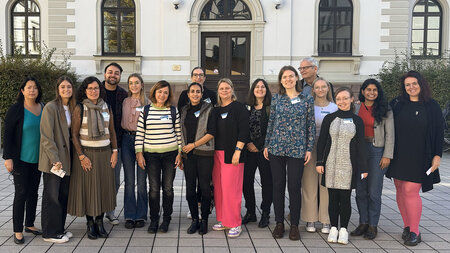Gesteuertes Laden V3.0 [Managed Charging V.3.0]
Grid integration of electric mobility on the way to the first commercial solutions
Projekt Partners
- BMW AG
- EWE Aktiengesellschaft, Oldenburg
- Technische Universität Ilmenau
- Fraunhofer IOSB - Institutsteil Angewandte Systemtechnik, Ilmenau
- Clean Energy Sourcing GmbH, Leipzig
Funding
Duration
12/2012-12/2015
Topic
 With the increasing distribution of electric vehicles, new opportunities as well as challenges arise for energy suppliers.
With the increasing distribution of electric vehicles, new opportunities as well as challenges arise for energy suppliers.
The aim of the GL3.0 project is the development of an intelligent energy-management system, which enables and facilitates optimal and network-compatible charging of electric vehicles. Further, this system allows the stabilisation of the German energy grid in long-term. Considering the fact a growing inclusion of renewables and the discontinuous availability of energy sourced from wind and solar an additional stabilisation of the energy grid becomes necessary.
In the process of the implementation of this intelligent energy-management system technical, economical as well as user specific aspects need to be considered. Concerning the user for example, all essential functions and information need to be available. Moreover, an incentive scheme has to be developed to promote an optimal user participation.
GL3.0 is a research and development project funded by the German Federal Ministry for the Environment, Nature Conservation, Building and Nuclear Safety.
Focus areas of the chair of Cognitive & Engineering Psychology within the project Gesteuertes Laden V3.0 [Managed Charging V3.0]:
A positive evaluation during the whole development phase is of utmost importance for the future distribution of such an intelligent energy-management system and the active participation and commitment of users. Consequently, the professorships task is to accompany the technical development as well as the optimization of the system from the user perspective. Therefore, preferences and requirements regarding the system design and possible remuneration models are assessed. Moreover, human- machine interfaces are investigated with regard to their usability and field test examine user relevant aspects (e.g. acceptance and motivation). Within the field tests, in which a selected group of users from the area of Berlin gets the opportunity to test the intelligent charging system, recent developments are evaluated under realistic conditions. The projects scope is to extrapolate essential measures to increase participation in the intelligent charging concept.
| Contact | E-Mail schreiben |
|---|---|
| Project leader | Prof. Dr. Josef Krems |
| Staff | Susen Döbelt, Ramona Wüstemann, Claudia Mair, Maria Kreußlein, Cynthia Heller |
Bildquelle: BMW Group AG







